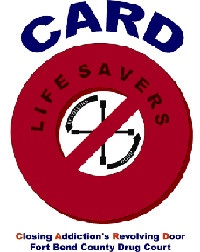 CARD is a program for people with addictions. It is a program for people who want to get better. It is a chance for people to learn skills to control their illness, to make a better life, and to begin to explore their potential as a drug free individual.
CARD is a program for people with addictions. It is a program for people who want to get better. It is a chance for people to learn skills to control their illness, to make a better life, and to begin to explore their potential as a drug free individual.
CARD is a court intervention program. It lasts from 12 to 18 months and has 3 separate phases and a preliminary phase. Upon successful completion, each participant’s case will be dismissed.
CARD is a volunteer program. Each participant must make a commitment to themselves, to other participants, and the CARD team, to be willing to recover. CARD includes therapy, behavioral modification, peer pressure, and court intervention. Therapy includes both group and individual formats. Behavioral modification is based on sanctions and incentives; rewarding a participant’s good behavior as well as punishing behavior that is conducive to drug use.
Why Drug Courts?
- 45% of offenders convicted of drug possession will recidivate with a similar offense within 2 to 3 years.
- The more frequently an offender has been arrested for a drug offense the more likely he or she is to recidivate.
- Drug addicts spend at least $50.00 per day on drugs. To maintain their drug habits, they commit larceny, burglary, robbery and other crimes.
- Drug Courts go beyond traditional roles. Intensive treatment is utilized through a collaborative effort of the bench, bar (prosecution and defense), treatment providers and law enforcement
- Drug courts use a well-structured treatment service which have the capacity to promptly address relapse and its consequences.
- Drug courts work. Drug courts offer a viable alternative to prison and decrease recidivism.
After an individual is arrested, and while they are held in the Fort Bend County Jail, a pre-trial interview is conducted. These interviews are screened for possible candidates for the CARD program. If a candidate meets the general eligibility criteria, then he or she will be interviewed to find out if they have interest in the CARD program.
If they are interested in the CARD program, they are then placed in the Preliminary Recovery Exposure Phase (PREP). This phase of the CARD program lasts approximately 3 weeks and exposes the candidate to types of substance abuse treatment and court appearances that will be required as a participant.
Phase One of the CARD program lasts at least 22 weeks. It includes: substance abuse therapy 4 days per week, individual or family therapy, weekly court appearances, random urinalysis, and weekly office visits. Additionally, the participant may be asked to attend 12-step meetings, and/or MRT therapy.
Phase Two lasts a minimum of 8 weeks and includes: weekly substance abuse therapy, weekly 12-step meetings, monthly (or more if necessary) individual or family counseling, random urinalysis, bi-weekly court appearances, and monthly office visits.
Phase three of the CARD program lasts a minimum of 12 weeks and involves: peer support meetings, weekly aftercare group meetings, 12-step meetings 3 times per week (actively working with a sponsor), random urinalysis, monthly court appearances, monthly office visits, and a monthly field visit from the supervising officer.
After the program participant has successfully completed the drug court treatment program, he or she will enter into aftercare. Peer support (evolved from the treatment group) will be the primary mode of therapy as professional involvement is gradually withdrawn. This is strictly voluntary and is offered without additional monitoring through the court.
Eligibility
To be eligible for the CARD program a potential participant must:
- Acknowledge their addiction.
- Be willing to recover.
- Be willing to actively participate within the CARD guidelines.
- Be charged with a Felony Offense, where the underlying circumstances of the offense involve substance abuse.
- Cannot be Violent Offenders.
- Cannot have substantial mental health or transportation problems that would prohibit their participation in CARD.
For More Information
Jim Syptak, C.A.R.D. Coordinator
Phone: 281-633-7243
Email: syptajim@co.fort-bend.tx.us
